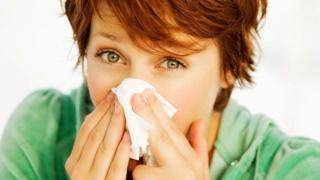
Image copyright
Getty Images
Health officials are trying to make sure everyone who needs a flu vaccine this autumn gets one.
Thirty million people will be offered the vaccine – the UK’s largest flu-immunisation programme to date.
The fear is the annual flu season will coincide with a coronavirus surge.
How can I get a flu jab?
The NHS offers the flu vaccine via your GP or your local pharmacy.
This year, the free vaccination is being offered in England to:
- Adults aged 65 and over
- People with some medical conditions, including diabetes, heart failure and asthma
- People who were required to shield from coronavirus – and anyone they live with
- Pregnant women
- Children aged from two-11
- Health and social care workers
Health officials in Scotland, Northern Ireland and Wales are planning to cover similar groups.
Later in the year, the flu vaccine may be given to people aged 50 to 64. But the NHS says anyone aged 50-64, and in an at-risk group, should “not delay” having the flu vaccine.
Doctors also want to increase vaccination levels in the most deprived areas and among people from ethnic minorities.
Many pharmacies will also offer the jab privately for about £20, although Boots has temporarily suspended bookings for anyone under the age of 65, to ensure its existing stock is prioritised for those at highest risk.
How bad is flu?
Flu – or influenza – is a very common, highly infectious disease, caused by a virus.
It can be deadly – particularly for older adults, very young children and people with underlying health conditions.
The average number of estimated deaths in England for the past five annual flu seasons is more than 11,000 – but there have been big variations each winter.
There were more than 22,000 estimated deaths in the 2017-18 season, but just short of 4,000 deaths in 2018-19.
Image copyright
Getty Images
Social distancing may influence the spread of the flu this year
Can you get flu and coronavirus together?
Theoretically yes, it is possible.
There’s some evidence that a double infection – of Covid-19 and flu together – could be more deadly than getting either single virus.
But there’s also a school of thought – yet to be proven in the case of coronavirus and flu – that having one virus could potentially help prevent a second from entering the body at the same time.
What is clear is that a big flu season combined with coronavirus could overwhelm hospitals – especially if lots of NHS or care-home staff are off sick with flu.
Who should take extra care and why?
The worry is that certain groups of people – the elderly, pregnant women and those with long-term health conditions – are at high risk of becoming seriously ill from both coronavirus and flu.
And while many healthy people can fight off the flu, there can be complications – most commonly a bacterial chest infection, which can develop into pneumonia.
Other potential life-threatening complications include meningitis and septic shock.
Could things actually be better this year?
Some countries in the southern hemisphere including South Africa and Australia – both nearing the end of their flu seasons – have reported lower levels of the illness than expected.
This could be partly because coronavirus lockdown measures – social distancing, masks and extra hand-washing – have also helped reduced the spread of flu.
But doctors say there’s no guarantee the UK flu season will follow the same trend, particularly as lockdowns ease, and are urging people to be vaccinated.
The World Health Organization (WHO) also warns of caution when interpreting trends.
In some countries, for example, reduced staffing levels during the Covid-19 pandemic could mean flu cases are not recorded in the same way as before.
Do I have flu or coronavirus?
Many of the symptoms are similar for both viruses:
Some people may also experience muscle aches, a headache, and possibly diarrhoea or vomiting.
And if you add in other common winter viruses it can be hard to be sure what is making someone ill.
Remember, both flu and coronavirus can also be spread before people have any symptoms – or by people who don’t get symptoms at all.
Image copyright
Getty Images
New measures may be put in place while people have their vaccinations
Is it safe to get the vaccine at my local GP surgery?
Because of the pandemic, health staff are being urged to:
- Minimise waiting
- Bring in extra staff if needed
- Consider asking people to wait in their cars until called
- Offer drive-through clinics if feasible
- Arrange home visits for the most vulnerable
Pregnant women may be offered jabs during antenatal appointments.
Are there enough supplies?
The Department of Health and Social Care says it has ordered additional quantities of the adult vaccine to ensure demand does not outstrip supply.
Will the flu vaccine work?
Every year, the WHO looks at the current circulating flu strains before recommending what the next set of vaccines should contain.
But because the vaccines often have to be made six months in advance, they can only ever be a prediction.
Experts say it’s better to be vaccinated against some strains of flu than none at all – particularly during a pandemic.
What do I need to know about the coronavirus?

















